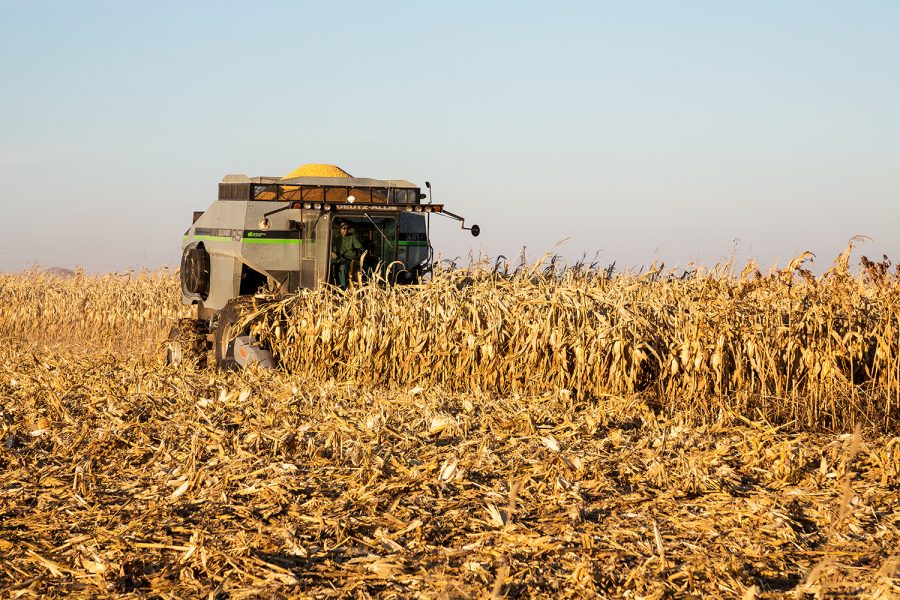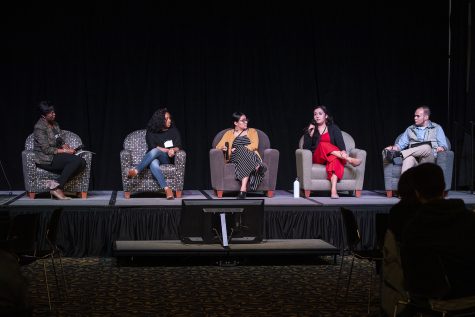Core course offered to UI students addresses dangers of farming
A core course focused on agricultural safety and health is being offered to UI students this June to increase both the awareness of the hazards associated with farming as well as ways that all professions can help reduce these hazards.
A farmer harvests corn near Washington, Iowa on Sunday, Nov. 19, 2017.
April 14, 2019
Farmers make up only around 2 percent of the U.S. population; however, research shows that individuals in the profession get injured at higher rates than those in other occupations. Iowa’s reliance on farming makes this a key concern for researchers, and efforts to reduce injury have begun across the country, including at the University of Iowa.
The UI addresses the growing problem through a focus on agricultural safety and education by offering students a core course focused on the topic. Running June 10-14, students will learn about the primary hazards of agriculture and how to prevent them based on expert analysis.
“We want to provide an overview of the hazards that are associated with agricultural work, and then focus on how do we prevent those hazards,” said Diane Rohlman, the core-course training director of Agriculture Safety and Health: The Core Course. “So our long-term goal really is to reduce injury and illness.”
Rohlman, an associate professor of occupational and environmental health, said the course offers individuals of all professions and backgrounds the opportunity to learn about the common injuries and hazards associated with agriculture.

“If they have to understand farming, they have to understand what the hazards are,” she said. “So when somebody comes into their office, they can ask questions and understand what’s going on.”
The course lasts nearly a week, with guest lectures from various experts, interactive activities, tours of local farms, and the opportunity to try on protective equipment, she said.
RELATED: New program through UI center seeks to ending farming-related accidents
The course will visit the National Education Center for Agricultural Safety at Northeast Iowa Community College to engage in real-life hazardous situations such as being buried in a grain bin or trapped in confined spaces, Rohlman said.
Education center Director Dan Neenan said the role of his program in the course is to provide the hands-on learning situations presented in the agricultural industry. It is important that people of all professions take this course to be exposed to the hazards, he said.
“I think the folks that are taking the course are future doctors and physicians …” Neenan said. “They may see this come through their emergency room, but what they’re missing is to actually see how it occurs … this gives them a heads up of what’s going on.”
Rohlman said another key reason the course is important is because agriculture is a unique profession that involves many generations in the work.
“Whole families are involved in it, and kids are active in it at a younger age than in other industries,” she said. “And so their brains and bodies are still developing while they’re doing tasks that put them at risk for injury.”
UI junior Kaitlyn Reth, who grew up on a farm, said her mother has told her stories for a long time about the injuries associated with agricultural professions.
She went to high school with a boy who grew up on a farm, she said, and his arm was cut off in an accident. If someone who grew up on a farm could be seriously injured like that, she noted, people with no knowledge are at an even greater risk.
“If you’re somebody coming from the outside who’s never worked on a farm … the common sense that I grew up with living on a farm would not even apply,” Reth said. “… that’s the biggest issue — They have no background knowledge.”





















